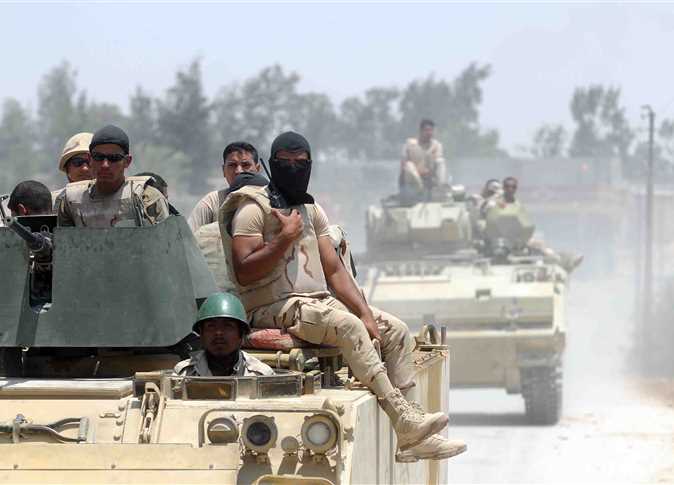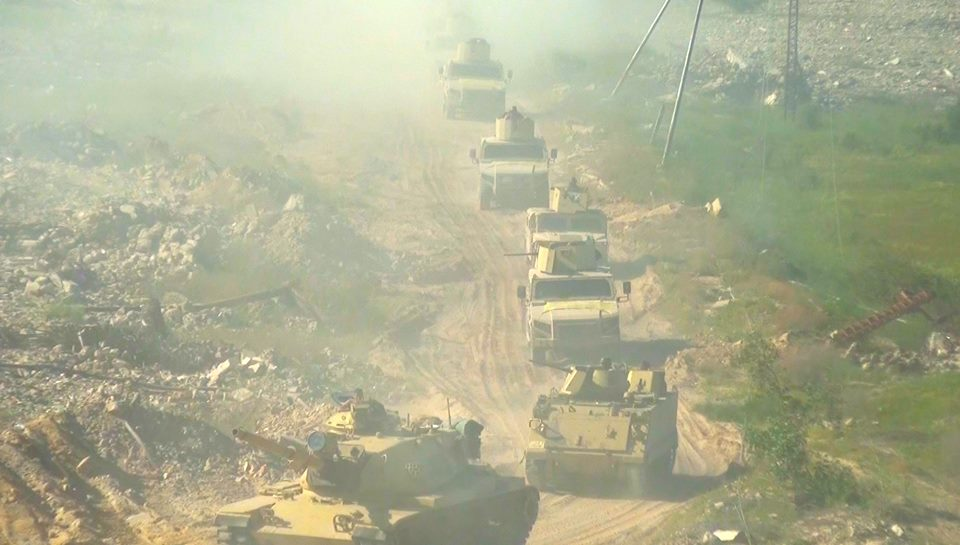The term “Takfiris” (groups who accuse other Muslims of apostasy) has been repeatedly used, particularly within the last several months, to describe certain political opposition groups who exercise violence in Sinai and elsewhere. They get executed immediately by security forces — not wounded or arrested; they have been predisposed as criminals who deserve to be killed.
I am not defending those violent groups. This would make no sense. I am trying to suggest the phenomenon be dealt with from its root, not by deploying police, security forces and military equipment to Sinai.
The task of the police is to maintain security in civil society, while the mission of the army is to defend the borders and ensure national security. The borders are not east of the Suez Canal, nor is civil security threatened on campuses where demonstrations take place.
The term "Takfiri" refers merely to a notion — there is no evidence of Islamist groups misjudging others. For anyone who acknowledges God and the prophet is not an infidel. We cannot know what is inside people's hearts. Death sentences like these must be supported by evidence and witnesses. They must be issued with confidence, not by suspicion.
Those convicted of being infidels could be innocent. They often don't deserve to be killed. Revenge or retaliation should not be met with murder, lest it fuels a vicious cycle of violence.
The isolation of certain small groups may well be responsible for their opposition to the majority. Minorities have their own leadership and their own economy. This is evident even in the drug and arms trade. They have their own ideas. They are a state within the state. They are governed by customs and traditions, not by the law.
Countering violence with violence can hurt children, women, elderly and youths from both sides. It becomes a conflict between what is above ground and what is underground, or between the state and groups that hide in tunnels like mice.
The dangerous aspect of this situation is the absence of rule of law. For law is the link between the state and the citizen, and between the citizen and the community. The law is the basis of the state, as expressed by Hegel in his “Elements of the Philosophy of Right.” In German, the words “right” and “law” mean the same thing. For the law expresses the right, and the right is based on the law.
As a result, violent groups against the state and vice versa means the stronger will win, not he who is right.
Violence is a social phenomenon that has its causes. It can only be eliminated by addressing the causes. That is why the security solutions do not work.
Isolation is one such cause. Isolation entrenches a group's traditional ideologies, with their archaic interpretation of Islamic jurisprudence, and with their viewing of others as infidels, especially in the absence of any other ideology like liberalism or socialism.
Many of the members of these groups are illiterate because they were educated by sheikhs and not in mainstream schools. They were never involved in political life. They did not evolve with political transitions between nationalism and socialism and capitalism.
There is talk about developing Sinai, increasing its population to five million, providing transportation lines and extending the Nile water to it in order to convert its desert into arable land.
Sinai is rich with minerals and has potential to attract thousands of tourists. Therefore, it cannot be handled with logic of infidelity and mistrust. For that logic only drips blood. That blood is the blood of Egyptians, regardless of whether they are Bedouins or from urban areas.
Sinai is the link between Egypt and its neighbors in the east and in the north. Its residents are influenced by groups like Hamas, Ansar Bait al-Maqdis and Hezbollah. They are more aware of what is happening in Palestine and in the Levant than they are aware of what is happening in the Nile Valley because they are closer to those areas.
Sinai has always been the eastern entrance of Egypt. Geographically, it is part of the Arabian Peninsula and the desert of the Levant. Arab conquerors entered into Egypt from Sinai at the dawn of Islam. It is not an empty land. It is full of people. Only the artificial borders that were marked between Egypt, the Levant and the Arabian Peninsula separate them.
Some fear that the Palestinians in the overpopulated Gaza Strip would be pushed to settle in Sinai to resolve the Palestinian issue at Egypt’s expense, in favor of Israel.
It is not right to perceive Sinai as a barren desert where terrorists and smugglers live. It is better to perceive it as a hub connecting Egypt to the Levant in the north and Saudi Arabia in the east. Perhaps it should be connected with Saudi Arabia by a bridge over the Gulf of Aqaba like the bridge between Saudi Arabia and Bahrain.
There was once a train between Cairo and Gaza, but its rails were extracted to build the Bar-Lev line. Instead of operating it again after the 6 October War victory in 1973, a buffer zone was marked between Gaza and Egypt, and the tunnels that linked the two sides were destroyed. The Rafah crossing was closed for national security purposes, while arms continued to be smuggled to extremist groups rather than to the Palestinian resistance.
Egypt’s strength is in that it is an open state with open borders. Its borders are open in the east with the Arabian Peninsula, in the north with Syria, Palestine and Jordan, and in the south with Sudan, which used to be one nation with Egypt.
Its borders are open in the west with Libya. There is no cultural barrier between Alexandria and Benghazi. The Awlad Ali tribe lives on both sides of the western border.
Nasser used to resolve any border dispute, such as in Wadi Halfa, by turning the area into a governorate with open borders to achieve unity, like in Halayeb and Shalateen, or Iskenderun between Syria and Turkey — unlike the border dispute between Yemen and Saudi Arabia on Asir and Najran, Oman and the United Arab Emirates on the Buraimi oasis, Kuwait and Iraq on a region under United Nations' auspices, or Egypt and Palestine on the al-Auja triangle.
Egypt’s strength is in its open borders. It is inconceivable that Israelis can enter Sinai without visas, while Egypt considers the Sinai residents as Takfiris.
Takfiris they may be. But they are still Egyptians.
Edited translation from Al-Masry Al-Youm


